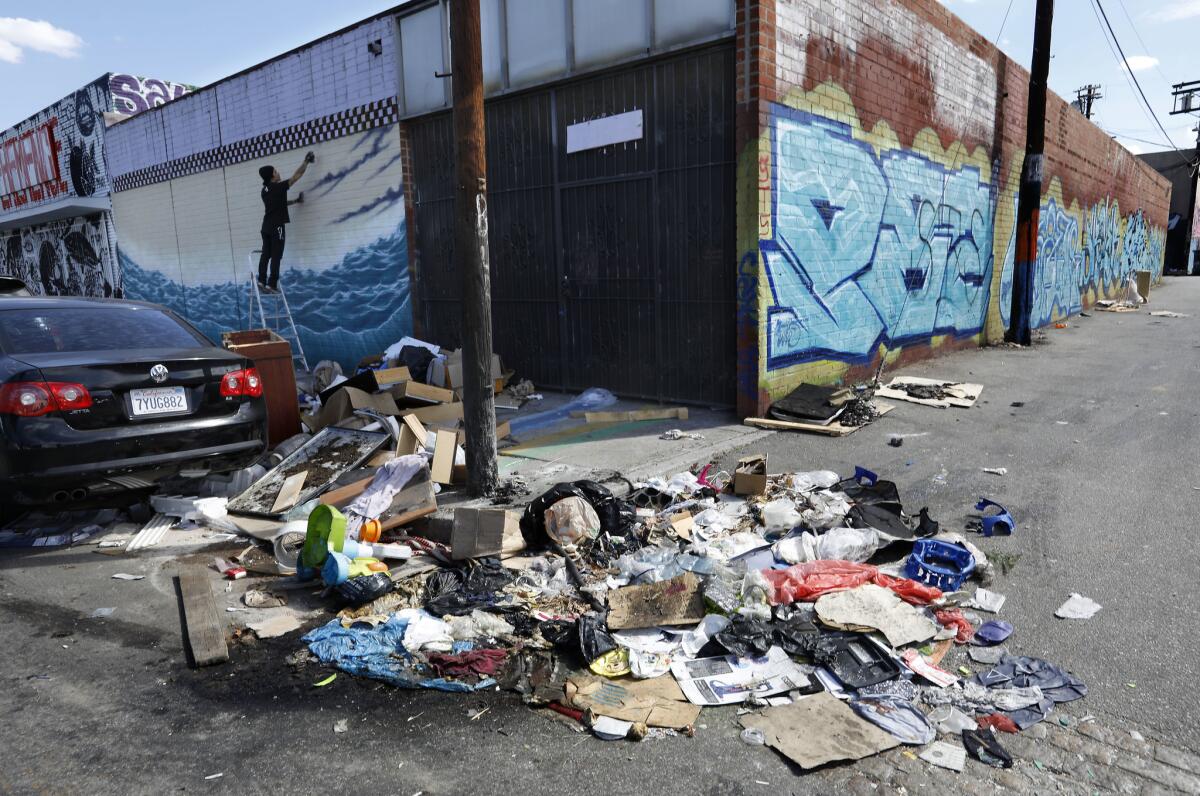Why is it taking so long to hire L.A.’s homeless to pick up trash?

- Share via
At a time when the sidewalks of Los Angeles are teeming with homeless encampments and too many of its streets are choked with trash, wouldn’t it be great if there were a program that would put homeless people to work cleaning up the refuse? It would be a win-win: Homeless people would get jobs. Trash would get cleared.
Yet a proposed year-long pilot program to do just that has been entangled in bureaucracy and politics for nearly two years. As it slogged through four hearings in three City Council committees, it lost its place in line for a blushingly modest grant of $2.9 million, even as the city was allocating hundreds of millions of dollars to homelessness programs. That’s absurd. In the panorama of ways to reduce homelessness and trash in the city, this program is the epitome of low-hanging fruit.
For the record:
2:44 p.m. July 23, 2019An earlier version of this editorial incorrectly stated how much participants in the pilot program would be paid. The correct figure is $14.25 an hour.
The program is intended to be a small but important effort to bring homeless people into the workforce and to help the city’s Bureau of Sanitation with basic litter cleanup. Meanwhile, the bureau could attend to higher-priority problems such as collecting bulky items and stemming the burgeoning tide of detritus left in part by encampments, in part by brazen illegal dumpers. In the pilot program, the city would partner with Chrysalis, a nonprofit that trains homeless and other low-income people to reenter the workforce they fell out of or never got into in the first place.
In this case, Chrysalis would train about 50 homeless people at a time to join various Bureau of Sanitation crews to assist with litter pick-up and weed abatement. The goal is to create a pathway into the job market; after a few months, workers would transition out of the program, hopefully into longer-term jobs that Chrysalis case managers would help them find. They would then be replaced by other homeless workers. The program would pay the local minimum wage, currently $14.25 an hour. If it is successful, workers will get launched toward stable, longer-term employment — and jobs that, hopefully, pay them enough to get them into housing — and more trash will get picked up.
And as Councilman Joe Buscaino noted in a memo to one committee, the pilot would be “a small investment that could, in the long term, generate revenue for the city by creating more taxpaying members of our workforce.”
But the proposal, which was introduced by Buscaino and Councilman Bob Blumenfield, got bogged down in questions about which city department it should be run out of and whether its costs could be cut here or there. (The budget was eventually trimmed to less than $2.6 million.)
Then late last year, labor representatives told city officials they didn’t like the fact that the pilot program would bring people in on a part-time basis. Instead, they suggested filling vacant Bureau of Sanitation positions through the city’s Targeted Local Hire program, which tries to place formerly incarcerated people, foster youths, veterans and other underserved residents (including formerly homeless people) in full-time city jobs. That’s a good objective, but it shouldn’t stand in the way of the pilot program and its mission to focus on getting homeless people training and jobs; nor does the pilot program prevent the city from filling vacant, full-time sanitation positions.
The funds for the pilot would come not out of the Sanitation budget, but from city or state funds set aside for homeless services. And if unions are worried that the city might eventually hire an army of low-paid homeless people to take over Sanitation Department jobs, that wouldn’t be the fault of the pilot program, which would stop after a year and be evaluated before being reauthorized and funded again.
Under the pilot, the city would be paying a modest number of homeless people to do a modest amount of trash pick-up. There will still be plenty of trash for full-time Bureau of Sanitation workers to collect. And if all goes really well, those homeless workers might work their way up to applying for full-time sanitation work and become new union members.
Council members owe it to their constituents to make sure that money isn’t misspent. But they also need to do more to reduce homelessness and clean up the city. What’s happening here is just wheel-spinning.
Homelessness is a crisis, as anyone who lives in Los Angeles knows and as city officials insist they know too. But they take an infuriatingly long time providing the most basic services to homeless people, whether it be toilets or storage facilities or shelter beds. Here is an enterprising program that would employ homeless people, and it’s taken twice as long to quibble over as the program itself would last.
The City Council should stop the dithering and get this funded and approved as soon as its members get back from their summer recess.
More to Read
A cure for the common opinion
Get thought-provoking perspectives with our weekly newsletter.
You may occasionally receive promotional content from the Los Angeles Times.









